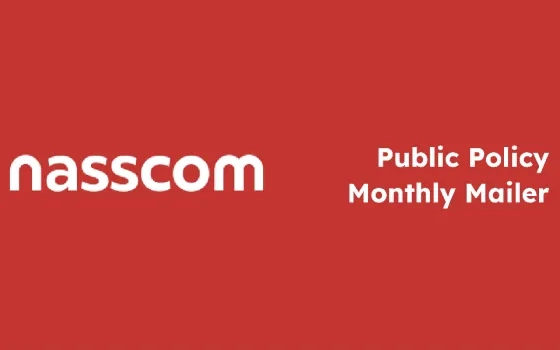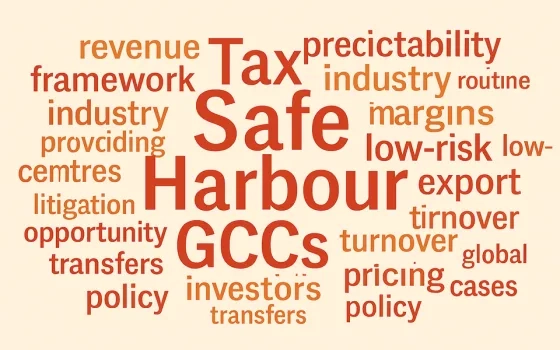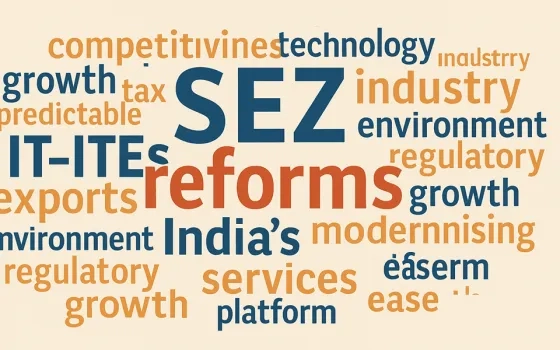|
 |
| Government Policy and Engagement Monthly Mailer |
| September 2025 |
Volume 7, Issue 9 |
|
 |
| GST Council strengthens export certainty, simplifies registration for online sellers, and brings clarity on treatment of discounts |
| On September 3, 2025, the GST Council took three decisions to benefit IT enabled services and ecommerce by easing compliance, releasing working capital and reducing disputes. Nasscom acknowledges the leadership of the Union Finance Minister, the GST Council and the Department of Revenue. |
| First, the Council recommended omitting section 13(8)(b) of the IGST Act so the place of supply for intermediary services follows the customer’s location. This restores export status and refund eligibility for services delivered from India and aligns the regime with international practice, removing the misclassification risk. |
| Second, the Council approved a simpler registration route for small suppliers selling through ecommerce across States. By reducing the need for multiple registrations, this will lower entry barriers for MSMEs and expand market access. |
| Third, the Council clarified the treatment of post-sale discounts. Allowing value reductions through credit notes with matching input tax credit adjustments, together with guidance on promotional schemes, will bring predictability for supply chains. |
| These steps support an export engine of over USD 224 billion and signal a strong ease-of-doing-business direction. Nasscom will continue to engage on the remaining reform agenda across taxation, SEZ operations and labour frameworks, including the HO–BO model, to further strengthen India’s competitiveness. For more information, please refer to the Press Release, and our paper highlighting the issues with respect to intermediary services along with suggestive reforms here. |
| We hosted an explanatory de-briefing session for our members on the outcomes of the GST Council Meeting where we welcomed the decisions of the GST Council for IT industry and unpacked other significant priority areas for the industry. |
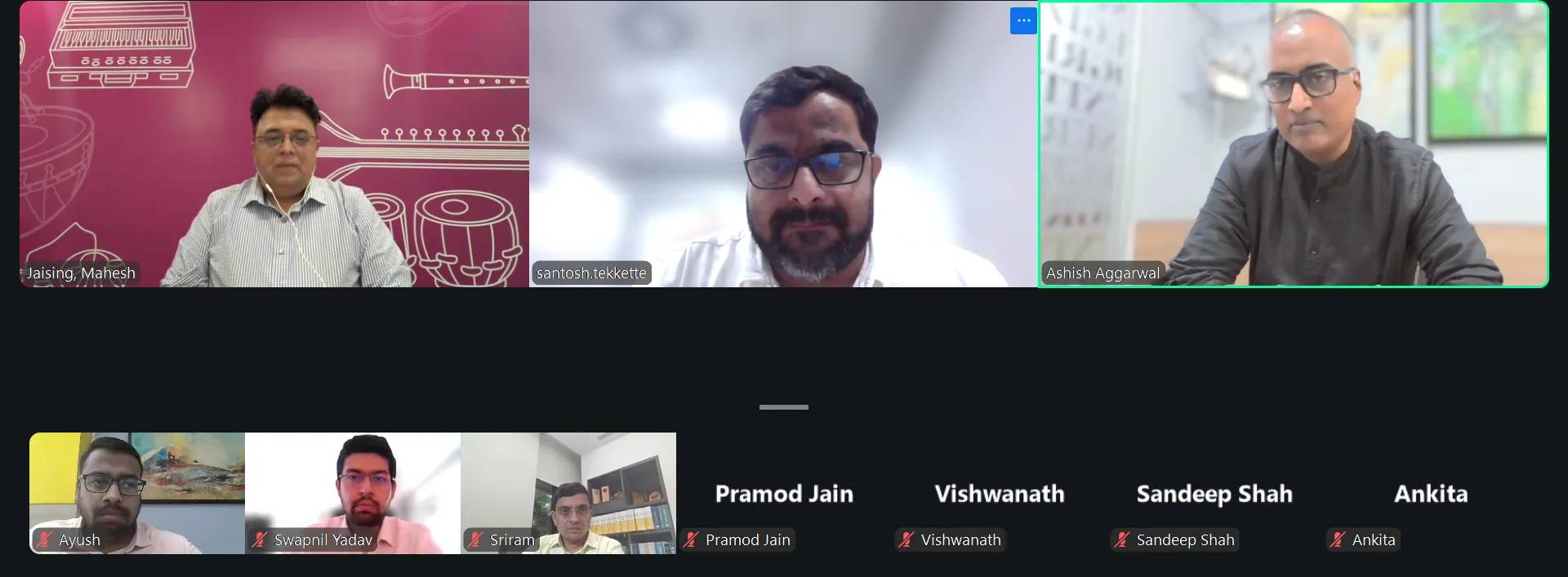 |
|
 |
| Nasscom’s SEZ recommendations to improve efficiency and preserve working capital |
| Special Economic Zones remain central to India’s export engine. With tax holidays phased out, competitiveness increasingly depends upon clear rules and smooth operations. Nasscom’s approach is a focused package of operational changes to increase efficiency and predictability. |
| We are discussing with the Ministry of Commerce six measures that together form a strong reform package: allow rupee billing for Domestic Tariff Area services with safeguards; recognise core employee welfare facilities as authorised operations; shift inter unit and inter SEZ transfers to an intimation model where no duty is due; digitise DSPF endorsements through one time supplier approvals; consolidate Letters of Approval within a state into a single compliance window; and align depreciation norms for rapidly evolving equipment. These steps would help cut compliance time, preserve working capital and support jobs. We continue to engage the Ministry on these proposals. For details, please refer to our paper here. |
| Discussions with the Ministry of Finance on aligning GST framework with export reality and reducing disputes for industry’s offshore and onsite delivery |
| The Head Office and Branch Office model is central to how the industry serves global clients. Under GST rules, services delivered to overseas customers through onsite branch offices are treated as exempt rather than zero rated. As a result, input tax credit does not flow and refunds are unavailable, embedding domestic GST in export pricing. Services imported by the Indian head office from the overseas branch are taxed under reverse charge, adding to costs. |
| Nasscom recommends aligning GST with FEMA and the Income Tax Act so that branch deliveries are recognised as exports with refunds. Restoring parity with subsidiaries and with export of goods would reduce litigation, improve cash flow and bring coherence across GST, FEMA and income tax law. We are engaging with the Ministry of Finance on a practical solution that addresses industry concerns. |
| Discussions with the Ministry of Finance to modernise tax safe harbour to serving its intended purpose for India’s GCCs |
| Safe Harbour Rules were introduced to give predictable transfer pricing outcomes for IT and ITES exporters. Uptake has been limited: the ₹300 crore ceiling excludes many Global Capability Centres; presumptive margins of 17 to 24 per cent sit above margins of about 14 to 15 per cent; service bands do not reflect how centres combine IT, BPM, analytics and R&D; and the employee-cost ratio is not a sound indicator of profitability. |
| Nasscom recommends a focused reset: remove the ceiling and use objective criteria such as cost-plus models; reset presumptive margins closer to 14 to 15 per cent; simplify categories to mirror delivery models; and withdraw the employee-cost ratio test. Provide multi-year certainty with simplified documentation and e-filing, reserving APAs for complex cases. Together, this will improve predictability, align margins with economic reality, and support GCC and export growth. We are engaging with the Ministry of Finance on measures to ease compliance and reduce disputes. For details on the issues, refer to our paper available here. |
| Submission to MeitY on Easing FEMA Compliances and Integrating SOFTEX and GST-R |
| As an export-driven industry, FEMA compliances are integral parts of our IT/ITeS industry and EoDB simplification is crucial for IT companies. Nasscom participated in the industry consultation with Secretary, MeitY on easing SOFTEX related compliances for IT exports. We emphasised to integrate and upgrade SOFTEX portal with the GST-R to remove multiplicity of filings and improve EoDB. We also emphasised continuing SOFTEX with some procedural changes like removal of invoice value limits and increasing the cap on advance payments rather than introducing EDF. (Read more) For more information, you may write to vertika@nasscom.in and ayush@nasscom.in. |
| Discussion with the RBI on Industry Issues and Trends |
| Prior to the MPC meeting in August, Monetary Policy Department of RBI invited select industry associations for a closed-door consultation to understand IT industry’s growth and challenges. Ashish Aggarwal presented a holistic view of the IT-ITeS industry in India, the growing trends of GCC, the state of Artificial Intelligence in IT industry and its impact on employment. We also took the opportunity to highlight industry’s concerns on Draft Foreign Exchange Management (Export and Import of Goods and Services) Regulations, 2025. We highlighted key policy recommendations seeking non-implementation of Export Declaration Forms for IT exports, clarity on the role of AD Banks and other operational efficiencies. For more details, you may write to ayush@nasscom.in. |
| DGFT | Nasscom submission on Draft Internal Compliance Programme (ICP) for export of dual-use (SCOMET) items |
| We welcome DGFT’s Draft ICP released on July 14, 2025, and the continuity with prior Nasscom–DGFT work. Our submission recommends retaining the existing eight-section ICP structure and nesting the draft’s ISO-style additions within it to ensure smooth adoption, cleaner record-keeping, faster and more consistent reviews/audits, and lower transition costs, especially for MSMEs. We requested clarity on the section on Service Quality Policy and recommended placing it under existing elements like Management Commitment, Roles/Resources, and Reporting & Corrective Action. We support strong document control and propose a simple version header with 3 Tier Author-Reviewer-Approver sign-off. For more details, you may write to swapnil@nasscom.in |
| STATE GOVERNMENT |
| Karnataka | State Assembly passed Karnataka Platform Based Gig Workers (Social Security and Welfare) Bill, 2025 |
| The state legislative assembly of Karnataka passed Karnataka Platform Based Gig Workers (Social Security and Welfare) Bill, 2025 with an objective to provide social security benefits to the platform-based gig workers in the state and providing certain rights to the workers. Nasscom actively pushed for key reforms in the proposed law through its recent representation on Draft Karnataka Platform based Gig Workers (Social Security and Welfare) Rules, 2025. We had also represented industry concerns on the previous version of the Bill in 2024. While the Act has incorporated some of the feedback, some concerns from the industry remains unaddressed. (Read more) For more details, you may write to prakash@nasscom.in. |
| Karnataka | Feedback on Draft Karnataka Platform based Gig Workers (Social Security and Welfare) Rules, 2025 |
| The Draft Karnataka Platform Gig Workers (Social Security and Welfare) Rules, 2025 under the Karnataka Platform based Gig Workers (Social Security & Welfare) Act 2025 (earlier Ordinance) provide various details on social security measures for gig workers in the state. Nasscom is actively involved in the finalization of these rules and its compatibility with standard industry models. We have submitted a detailed representation highlighting key policy recommendations such as making the e-Shram UAN optional for social security benefits, capping of welfare fee at 1–2% of payouts to ensure parity across aggregators and clarity on the definitions of gig workers. (Read more) For more details, you may write to prakash@nasscom.in. |
|
 |
| Meeting with MoCI Minister Piyush Goyal upon conclusion of DCC Framework |
| On August 4, 2025, Nasscom President Rajesh Nambiar led a high-level meeting with MoCI officials and minister Mr. Piyush Goyal along with leaders from large member companies. We discussed major milestones for the IT Industry and the unprecedented DCC Framework approved along with the India – UK FTA. The DCC Framework shall provide significant benefits to professionals moving temporarily between the two countries by exempting them from paying social security contributions in both nations simultaneously. It will ensure that employees are able to recover their NI contribution made to the UK Government, which was getting totally lost to the UK exchequer. The inclusion of DCC was made possible due to our sustained efforts with the central government. |
| Stakeholders’ consultation on proposed Draft DC Policy |
| On August 5, 2025, Nasscom participated in a stakeholder consultation convened by MeitY in Delhi to discuss India's proposed data center policy framework. During the meeting, we emphasised the critical need for regulatory certainty to support specialised infrastructure like data centers, the establishment of national-level guidelines on aspects like banking of RE and open access, and an efficient coordination mechanism between central and state authorities to enhance ease of doing business for the data center ecosystem. For more details, you may write to sudipto@nasscom.in. |
| India – Singapore JWG meeting on Digital Technologies |
| The India – Singapore JWG on Digital Technologies has been constituted to foster collaboration in the digital domain, including the exchange of experiences and knowledge on digital technology-based solutions in the implementation of digital initiatives in both the countries. Our Global Trade Development team participated in the inaugural JWG meeting held on August 6, 2025. Key discussions focused on DPI, Data Governance & AI and Potential collaboration between industry and startups. We raised concerns regarding the Compass issue impacting workforce mobility for Indian companies operating in Singapore. The Compass framework is a points-based system to generate employment pass for foreign professionals working in Singapore. The meeting was co-chaired by Mr. Ajit Kumar, Joint Secretary, ICD, MeitY, and Mr. Choy Yong Cong, Director, IAD, MDDI, Singapore. |
| Webinar on ‘Do India's E-commerce Policies Balance Innovation and Regulation |
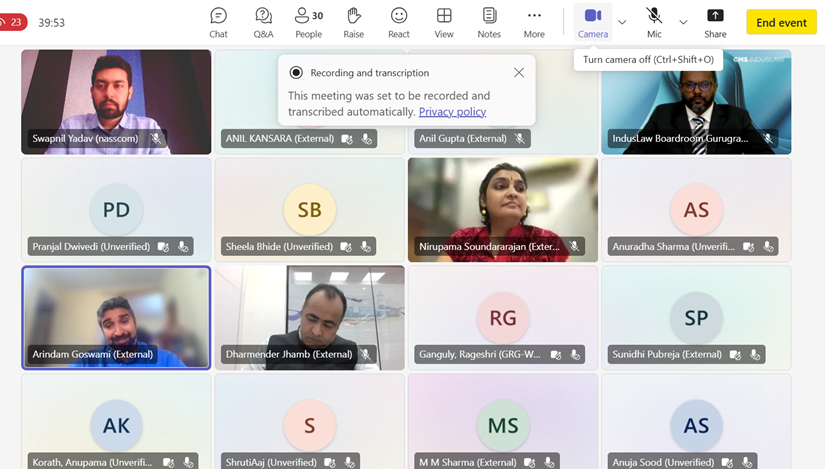 |
| On August 12, 2025, we participated in a webinar, organised by PCC, titled “Do India’s E-commerce Policies Balance Innovation and Regulation?”, to discuss whether India’s e-commerce framework balances innovation with regulation and consumer protection. Swapnil Yadav discussed the BIS draft standard on e-commerce guidelines with a focus on strengthening consumer protection through anti-counterfeit measures, enhanced disclosures, and fair-market practices; he also examined challenges around material-composition and environmental disclosures, express consent, bundling of services, and safeguarding legitimate business practices. |
| Panel discussion on partnerships for equity in an AI driven creative economy |
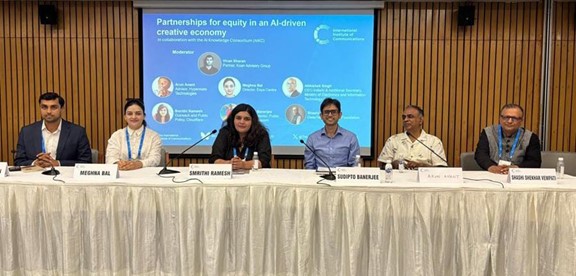 |
| On August 27, 2025, we participated in an insightful panel discussion at the India Digital Communication and Media Forum in Delhi organised by IIC in collaboration with AI Knowledge Consortium. Sudipto Banerjee provided perspectives on the emerging landscape of Generative AI startups under Nasscom’s Gen AI startup Foundry, highlighting their growing influence across cinema, music, and creative content production. He emphasised that GenAI startups are focusing on niche markets to build tailored creative solutions and thus, capital for sustainability and regulatory clarity in India’s copyright framework is required for stable growth. |
| Empowering Women Entrepreneurs in Karnataka |
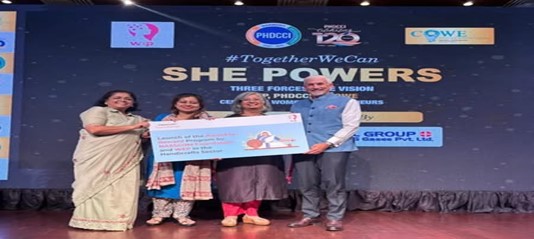 |
| Nasscom Foundation, in collaboration with WEP, NITI Aayog, proudly launched the ATR program to empower rural women entrepreneurs from Karnataka’s handicraft sector and then extended to Northeast India. The launch event was graced by distinguished leaders including Shombi Sharp UN Resident Coordinator, India, along with Anna Roy, WEP – NITI Aayog and Jyoti Sharma who together marked the beginning of this collaborative initiative. Over the next nine months, ATR will offer a dynamic blend of digital upskilling, entrepreneurial development, and business enablement supporting rural women in scaling their ventures and integrating into the digital economy. |
| Discussion on EoDB for IT-ITeS Industry in Rajasthan |
| Nasscom met the Commissioner Rajasthan Bureau of Investment Promotion. The interaction focused on matters related to EoDB in the state, strengthening the enabling ecosystem for IT-ITeS companies in Jaipur, and the overall policy landscape of Rajasthan for attracting and retaining investments. The discussion also touched upon challenges faced by companies in operating within the state and possible measures to enhance Rajasthan’s competitiveness as a destination for technology-led investments. Our membership team, along with the Regional Council members of Rajasthan drove forward-looking discussions on a range of EoDB issues for the industry. |
| Formulation of IT Policy for Uttarakhand |
| Nasscom met with the Vice President of Setu Ayog from government of Uttarakhand regarding the IT policy for the state. We emphasised that EoDB, streamlined clearances, connectivity, quality of life and reliable power supply are essential to build an IT destination. It is also important to strengthen the academia-industry linkages and create talent development opportunities. Thus, our Public Policy and Membership team in the meeting highlighted the need to focus on key differentiating factors including a niche area, talent availability, competitive landscape, and technological priorities for Uttarakhand to become a preferred IT destination. |
| REGULATORY CONSULTATIONS |
| Committee for Preparation of a Working Paper on Artificial Intelligence and Copyright |
| As a member of the Committee for Preparation of a Working Paper on AI and Copyright, nasscom submitted its suggestions for the benefit of the committee. Based on stakeholders’ consultation, we have given specific recommendations on how to enable training of models in India while ensuring protection of legitimate interests of copyright holders. For more details, you may write to sudipto@nasscom.in. |
|
 |
| Parliament’s Standing Committee Report on CCI and DCB |
| On August 11, 2025, MCA presented the Standing Committee on Finance’s Report on the “Evolving Role of CCI in the Digital Economy” in the Lok Sabha. The Report aligns with Nasscom’s prior submissions (here and here) on implementing NCP and adopting an evidence-based approach to ex-ante provisions under the DCB. The Committee recommended implementing the NCP, refining SSDE thresholds with rebuttal rights, strengthening CCI’s autonomy and capacity, protecting MSMEs, ensuring effective enforcement, and fostering inter-regulatory cooperation. For more details, you may write to ayush@nasscom.in and sudipto@nasscom.in. (Read more) |
| Release of Guidelines for Examination of CRI, 2025 |
| On July 29, 2025, CGPDTM released the CRI Guidelines, 2025. As per the press release, the guidelines aim to enhance clarity, consistency, and predictability in the examination of CRIs, particularly in response to the rapidly evolving technological landscape. The CRI guidelines discuss examination of AI, blockchain, and quantum computing -related inventions under a separate chapter. The Guidelines also provide numerous non-exhaustive illustrative scenarios to discuss the patentability of these inventions. Similarly, Annexure I lists various non-exhaustive examples to illustrate allowable/non-allowable inventions. (Read more) For more details, you may write to dhananjay@nasscom.in. |
| AD Banks |
Authorised Dealer Banks |
| AI |
Artificial Intelligence |
| ATR |
Award to Reward |
| AVGC |
Animation, Visual Effects, Gaming, and Comics |
| BIS |
Bureau of Indian Standards |
| CCI |
Competition Commission of India |
| CGPDTM |
Controller General of Patents, Designs, and Trademarks |
| CRI |
Computed related Invention |
| DCB |
Digital Competition Bill |
| DCC |
Double Contribution Convention |
| DGFT |
Directorate General of Foreign Trade |
| DPI |
Digital Public Infrastructure |
| EDF |
Export Declaration Form |
| FEMA |
Foreign Exchange and Management Act |
| FTA |
Free Trade Agreement |
| GCC |
Global Capability Centre |
| GOI |
Government of India |
| GST |
Goods and Service Tax |
| GST-R |
Goods and Services Tax Returns |
| HO-BO |
Head Office-Branch Office |
| IAD |
International Affairs Division |
| ICD |
International Cooperation Division |
| IIC |
International Institute of Communication |
| ICP |
Internal Compliance Framework |
| IT |
Information Technology |
| ITeS |
Information Technology enabled Services |
| MCA |
Ministry of Corporate Affairs |
| MDDI |
Ministry of Digital Development and Information |
| MeitY |
Ministry of Electronic and Information Technology |
| MPD |
Monetary Policy Department |
| MSME |
Micro Small and Medium Enterprise |
| NCP |
National Competition Policy |
| NI |
National Insurance |
| NSWS |
National Single Window System |
| NTP |
National Telecom Policy |
| PCC |
Policy Consensus Centre |
| RBI |
Reserve Bank of India |
| RE |
Renewable Energy |
| SEZ |
Special Economic Zone |
| SOFTEX |
Software Export |
| SSDE |
Systemically Significant Digital Enterprises |
| TDS |
Tax Deducted at Source |
| UAN |
Universal Account Number |
| UK |
United Kingdom |
| WEP |
Women Empowerment Program |
|
|
| www.nasscom.in |
    |



